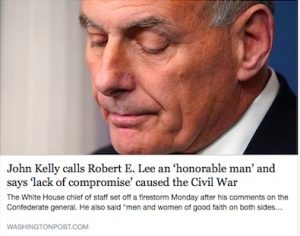 Yesterday, John Kelly made the news when he said the Civil War could have been avoided through compromise. Many people pointed out that decades of compromises actually preceded the war, and that those compromises were predicated upon the egregious idea that white people have greater value than African Americans and that human beings can be held as property. Read more.
Yesterday, John Kelly made the news when he said the Civil War could have been avoided through compromise. Many people pointed out that decades of compromises actually preceded the war, and that those compromises were predicated upon the egregious idea that white people have greater value than African Americans and that human beings can be held as property. Read more.
That said, in a time of increasing polarization of views, many people are pointing out that if we can learn how to listen to people with whom we disagree, even when they are offensive to us, we might be able to participate in growth and healing and bridge building that decreases the polarization and increases care and community. Three recommendations of sources that have helped me to think about how we can move forward from this polarized time:
1. Christena Cleveland’s excellent book, Disunity in Christ: Uncovering the Hidden Forces that Keep Us Apart. This book explicitly addresses the forces that keep Christians separated from one another–forces that usually come down to culture rather than theology. She offers multiple practical suggestions and lots of examples of how we can challenge one another to become more unified as those who follow Jesus. I highly recommend this book for any individual or church group seeking to understand and unite with other Christians who seem separated by culture, race, or other factors.
2. Jonathan Haidt’s interview with Krista Tippett. Haidt has done a lot of research into why we believe what we believe and also why we are separated from each other. He talks here about why conservatives understand liberals more than liberals understand conservatives, and how his own (very liberal) views have changed by doing this research.
3. TED Radio Hour on “Dialogue and Exchange” in which a civil rights activists shares about talking with a KKK member, and a woman who participated in the Westboro Baptist Church (the small church that protests regarding gay marriage and abortion in particularly hateful ways) talks about leaving her church and her family once she recognized that their views were wrong.


